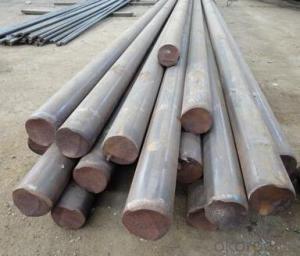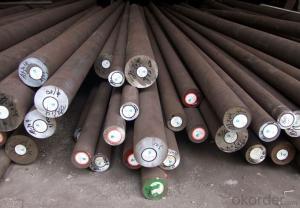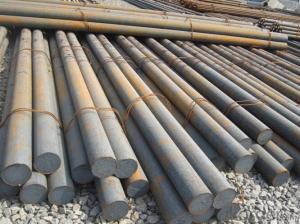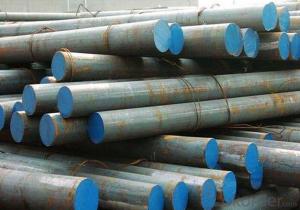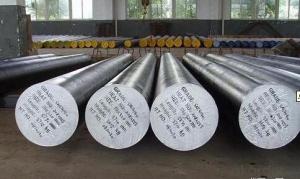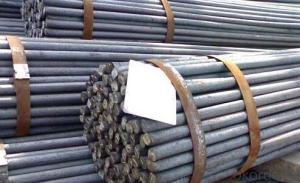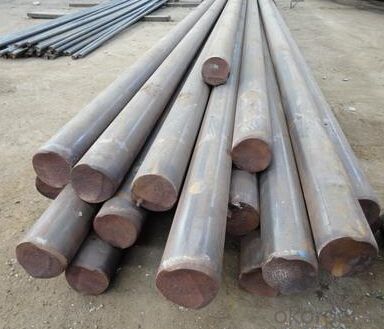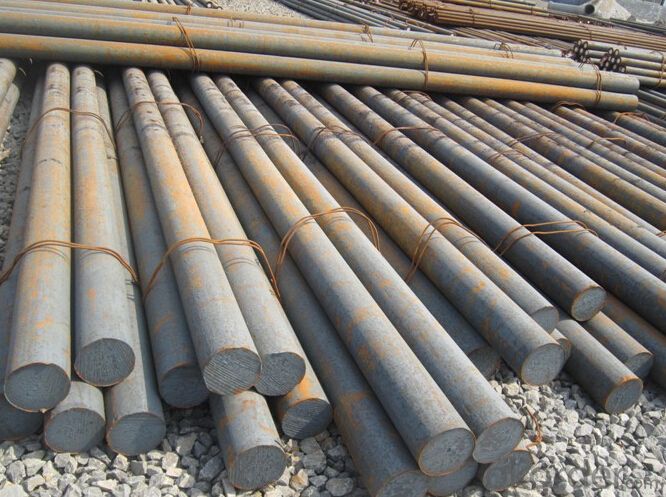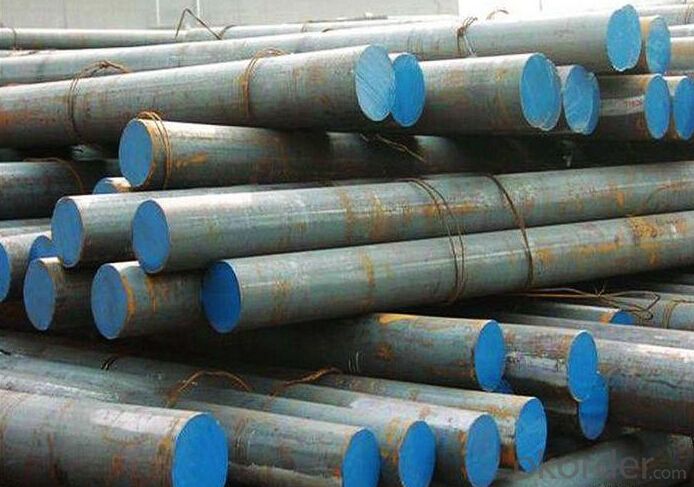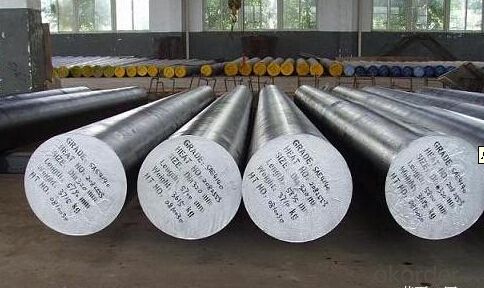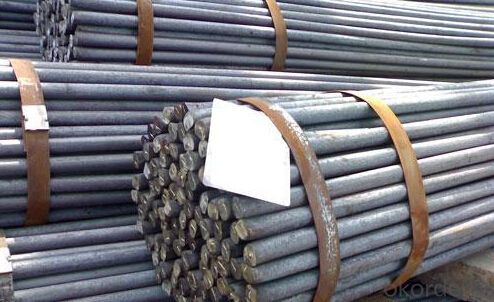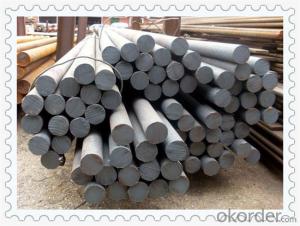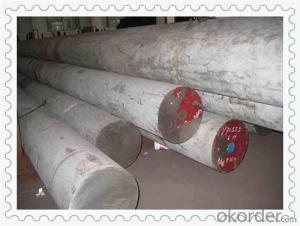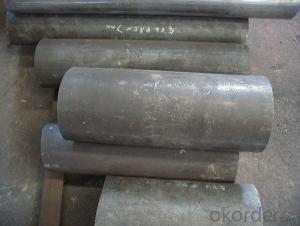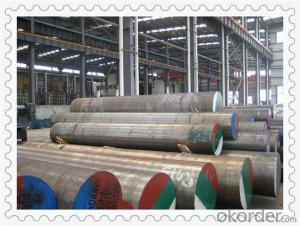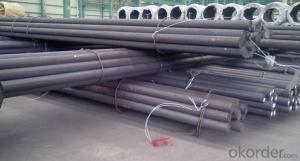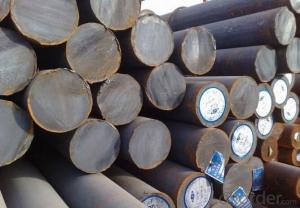SAE1018/1020/1035/1045/1050/1055/1060 Carbon Steel Round Bar
- Loading Port:
- Qingdao
- Payment Terms:
- TT OR LC
- Min Order Qty:
- 5 m.t.
- Supply Capability:
- 100000 m.t./month
OKorder Service Pledge
Quality Product, Order Online Tracking, Timely Delivery
OKorder Financial Service
Credit Rating, Credit Services, Credit Purchasing
You Might Also Like
Specification
Type:
Carbon Steel,Spring Steel,Bearing Steel,Gear Steel,Deformed Steel,Stainless Steel,Alloy Steel
Shape:
Steel Coil,Steel Sheet,Steel Wire Rod,Steel Flat Bar,Steel Square Bar,Steel Angle,Steel Round Bar,Steel Billets
Technique:
Hot Rolled,Cold Rolled,Cold Drawn,ERW,Forged,Saw,Extruded,EFW,Spring
Surface Treatment:
Galvanized,Coated,Copper Coated,Color Coated,Oiled,Dry,Chromed Passivation,Polished,Bright,Black,PVDF Coated
Certification:
ISO,SGS,BV,IBR,RoHS,CE,API,BSI,UL
Thickness:
12-480mm
Width:
12-480mm
Length:
6-12m
Outer Diameter:
12-480mm
Net Weight:
100kg
Packaging:
seaworthy packaging
SAE1018/1020/1035/1045/1050/1055/1060 Carbon Steel Round Bar
Detailed Information of SAE1018/1020/1035/1045/1050/1055/1060 Carbon Steel Round Bar
| Name | Steel Round Bar |
| Shape | Round Bar/Square Bar/Flat Bar/Plate/Wire |
| Standard | GB/ASTM/SAE/AISI/DIN/JIS/EN/BS |
| Surface Treatment: | Black/Peeling/Polished/Machined |
| Delivery Condition: | Hot Rolled or Forged/Peeled or Black Surface |
| Test | SGS/UT 100% Elements Testing |
| Certificate: | ISO/Mill Certificate |
| Service: | 24 hours online service / |
| more than 20 years trading and manufacture | |
| Quality Assurance: | the third party inspection, such as SGS, BV, TUV…etc. is acceptable |
| Packaging Details: | Seaworthy Packaging or as per customer's packing instruction |
Product Overviews of SAE1018/1020/1035/1045/1050/1055/1060 Carbon Steel Round Bar
| Product Name | Typical Grades | Diameter(mm) | Standard Adopted |
| Carbon Steel | 20 (1020/S20C/C22) | ||
| 40 (1040/S40C/C40) | Ø16-Ø300 | ||
| 45 (1045/S45C/C45) | |||
| Bearing Steel | GCr9 (51100/SUJ1) | ||
| GCr15 (52100/SUJ2/100Gr6) | Ø12-Ø250 | ||
| GCr9SiMn (A485-Gr.1/SUJ3) | GB/SAE/ | ||
| Cr-Mo Steel | 20Cr (5120/SCr420H/20Cr4) | JIS/DIN | |
| 40Cr (5140/SCr440/41Cr4) | Ø12-Ø250 | ||
| 42CrMo(4140/SCM440/42CrMo4) | |||
| Gear Steel | 20CrNiMo | ||
| 20CrMn(5115/SMnC420/20MnCr5) | Ø16-Ø600 | ||
| 20CrNiMo(8620/SNCM220/20CrMiMo2) |
Company Introduction of SAE1018/1020/1035/1045/1050/1055/1060 Carbon Steel Round Bar
CNBM International Corporation is the most import and export platform of CNBM group(China National Building Material Group Corporation) ,which is a state-owned enterprise, ranked in 270th of Fortune Global 500 in 2015.
With its advantages, CNBM International are mainly concentrate on Cement, Glass, Iron and Steel, Ceramics industries and devotes herself for supplying high quality series of refractories as well as technical consultancies and logistics solution.
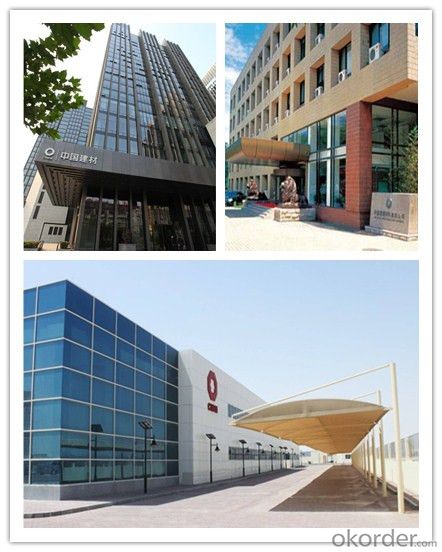
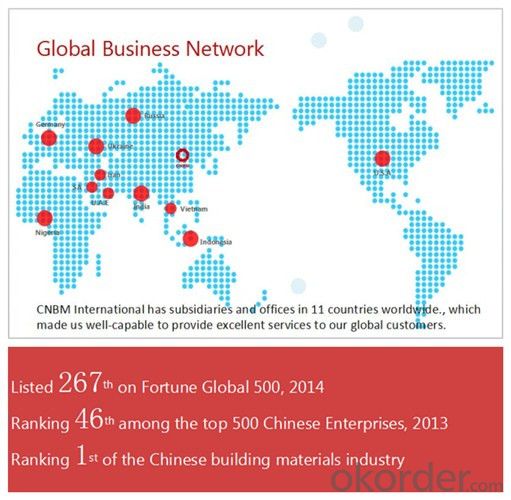
| After-sale service | l CNBM provides the services and support you need for every step of our cooperation. We’re the business partners you can trust; you can relax and get on with doing business. |
| l For any problem, please kindly contact us at any your convenient time, we’ll reply you in our first priority within 24 hours | |
| Advantages | l Industry experience over 20 years. |
| l Shipment of goods -More than 70 countries worldwide. | |
| l The most convenient transport and prompt delivery. | |
| l Competitive price with best service. | |
| l High technical production line with top quality products. | |
| l High reputation based on best quality products. | |
Packaging & Delivery of SAE1018/1020/1035/1045/1050/1055/1060 Carbon Steel Round Bar
| Packaging Detail | Sea worthy packing /as per customer's packing instruction |
| Delivery Detail | 15 ~ 40 days after receiving the deposit |
Products Show
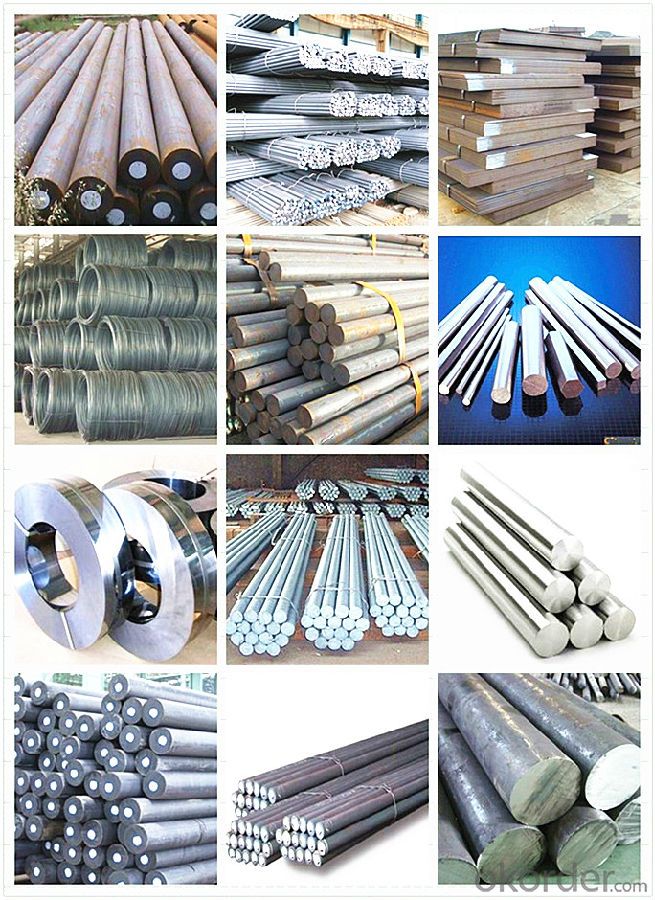
FAQ:
| Are you a trading company or manufacturer? | Manufacturer |
| What’s the MOQ? | 1000m2 |
| What’s your delivery time? | 15-20 days after downpayment received |
| Do you Accept OEM service? | Yes |
| what’s your delivery terms? | FOB/CFR/CIF |
| What's the Payment Terms? | 30% as deposit,70% before shipment by T/T |
| Western Union acceptable for small amount. | |
| L/C acceptable for large amount. | |
| Scrow ,Paybal,Alipay are also ok | |
| Why choose us? | Chose happens because of quality, then price, We can give you both. Additionally, we can also offer professional products inquiry, products knowledge train (for agents), smooth goods delivery, excellent customer solution proposals. |
| What's your available port of Shipment? | Main Port, China |
| What’s your featured services? | Our service formula: good quality+ good price+ good service=customer's trust |
| Where are your Market? | Covering more than 160 countries in the world |
- Q: How does special steel contribute to the aerospace defense machinery industry?
- Special steel plays a crucial role in the aerospace defense machinery industry by providing exceptional strength, durability, and resistance to corrosion and high temperatures. It is used extensively in the manufacturing of various components such as landing gears, turbine blades, structural frames, and armor plating for military aircraft and defense systems. Its unique properties ensure optimal performance, safety, and reliability of these critical machines, enabling them to withstand challenging environments and extreme operating conditions.
- Q: What are the different joining methods for special steel?
- The different joining methods for special steel include welding, brazing, soldering, and adhesive bonding.
- Q: How does special steel contribute to the agriculture industry?
- Special steel plays a crucial role in the agriculture industry by providing durable and high-performance materials for various agricultural machinery and equipment. These steels are specifically designed to withstand the harsh conditions and heavy workloads encountered in farming operations, resulting in increased efficiency and productivity. One of the primary applications of special steel in agriculture is in the manufacturing of tillage equipment such as plows, cultivators, and harrows. These implements require robust materials that can withstand the abrasion and impact of soil and rocks. Special steel provides the necessary strength and hardness to ensure that these implements can effectively break up the soil, improve soil quality, and prepare the land for planting. Additionally, special steel is extensively used in the production of machinery for planting, harvesting, and processing agricultural products. For instance, combine harvesters, which are vital for large-scale crop harvesting, heavily rely on special steel components for their cutting systems, threshing mechanisms, and grain handling systems. By using special steel, these machines can efficiently handle the demanding tasks of crop collection, separation, and storage. Moreover, special steel contributes to the agriculture industry by enhancing the longevity and reliability of equipment. Agricultural machinery operates in challenging environments that expose them to corrosive elements, moisture, and extreme temperatures. Special steel, often coated with protective layers, offers resistance against corrosion, rust, and wear, ultimately extending the lifespan of agricultural equipment. Furthermore, the use of special steel in the manufacturing of machinery leads to improved precision and accuracy in agricultural operations. Modern farming techniques increasingly rely on precision agriculture, which involves using advanced technologies to optimize productivity, reduce waste, and conserve resources. Special steel components enable more precise movements, better control, and increased accuracy in machinery, leading to improved efficiency and minimizing waste. Overall, special steel is vital to the agriculture industry as it provides the necessary strength, durability, and precision required for various agricultural machinery and equipment. By utilizing these high-quality materials, farmers can enhance productivity, reduce downtime, and achieve sustainable farming practices.
- Q: How is structural steel used in building construction?
- Structural steel is widely used in building construction for its strength, durability, and versatility. It is used to create the main framework of buildings, including columns, beams, and trusses, providing support and stability to the structure. The use of structural steel allows for large open spaces, as it can span long distances without the need for additional support. Additionally, it is often used in the construction of high-rise buildings, bridges, and industrial structures, due to its ability to withstand heavy loads and resist extreme weather conditions.
- Q: How does special steel perform in pharmaceutical applications?
- Special steel performs well in pharmaceutical applications due to its excellent corrosion resistance, high strength, and ability to withstand extreme temperatures. It ensures the integrity and purity of pharmaceutical products by preventing contamination, thereby maintaining the quality and safety of drugs. Additionally, special steel's ease of cleaning and sterilization makes it an ideal choice for pharmaceutical equipment and machinery.
- Q: What are the different corrosion protection methods used for special steel?
- To ensure the durability and longevity of special steel, various methods are employed for corrosion protection. These methods encompass: 1. Coatings: The application of diverse coatings, including paint, epoxy, or zinc, creates a protective layer on the steel surface. Such coatings function as barriers, preventing direct contact between moisture, corrosive elements, and the steel. 2. Galvanization: By coating the steel with a layer of zinc through the process of galvanization, a sacrificial barrier is formed wherein the zinc corrodes instead of the steel. Galvanized steel is commonly utilized in outdoor applications such as fences, poles, and roofing. 3. Stainless steel: Special steel can be manufactured using stainless steel, which contains a high percentage of chromium. The presence of chromium results in the formation of a passive layer on the steel's surface, endowing it with excellent corrosion resistance. Stainless steel finds wide usage in industries like construction, food processing, and medical equipment. 4. Cathodic protection: This method involves the creation of an electrical current or the utilization of sacrificial anodes to protect the steel. By introducing a more reactive metal (sacrificial anode) or applying an electrical current, corrosion is minimized as the reactive metal corrodes instead of the steel. 5. Alloying: Modifying the steel's composition by incorporating elements like nickel, molybdenum, or copper can enhance its resistance to corrosion. These alloying elements form a protective layer on the surface, rendering the steel more resistant to rust and other forms of corrosion. 6. Passivation: Passivation is a chemical process that eliminates free iron from the steel's surface, leading to the formation of a protective oxide layer. This layer acts as a barrier against corrosion, augmenting the steel's resistance to rust and other forms of corrosion. 7. Proper maintenance: Regular inspection, cleaning, and maintenance of special steel play a vital role in preventing corrosion. The removal of dirt, debris, and other contaminants from the steel's surface aids in preserving its protective coatings and averting corrosion. It is crucial to select the appropriate corrosion protection method based on the specific application and environmental conditions to ensure the long-term performance and durability of special steel.
- Q: What is the difference between special steel and regular steel?
- Special steel refers to a specific type of steel that has been enhanced with additional alloying elements or has undergone specialized treatments to enhance its strength, durability, or other desired properties. Regular steel, on the other hand, refers to common or standard steel that does not possess these additional features or improvements. The key difference lies in the composition and processing, as special steel is engineered to meet specific requirements for particular applications, such as high-temperature resistance, corrosion resistance, or increased hardness.
- Q: What industries rely on special steel?
- Several industries rely on special steel, including automotive, aerospace, construction, energy, and manufacturing. Special steel is known for its exceptional strength, durability, and resistance to corrosion, making it an essential material in these sectors. It is used for various applications such as structural components, machinery parts, tools, pipelines, and turbines, among others.
- Q: How does the cost of special steel compare to regular steel?
- The cost of special steel is generally higher than regular steel due to its unique properties, manufacturing processes, and limited availability.
- Q: What is special steel? What is special steel?
- However, special steel refers to stainless steel, other special steel plate, such as automobile steel plate and military steel plate, etc., stainless steel is divided into austenite and ferrite, such as 304316410439 stainless steel varieties. According to the specific use of stainless steel quality, such as 409L can be used as a container, microwave oven and elevator industry, 304 can be used as medical devices. The market prospect is not an ordinary person can predict, domestic steel prices are monthly pricing, big companies such as Baosteel, TISCO, Zhangjiagang Pohang. Lead the trend of special steel prices.
Send your message to us
SAE1018/1020/1035/1045/1050/1055/1060 Carbon Steel Round Bar
- Loading Port:
- Qingdao
- Payment Terms:
- TT OR LC
- Min Order Qty:
- 5 m.t.
- Supply Capability:
- 100000 m.t./month
OKorder Service Pledge
Quality Product, Order Online Tracking, Timely Delivery
OKorder Financial Service
Credit Rating, Credit Services, Credit Purchasing
Similar products
Hot products
Hot Searches
Related keywords
